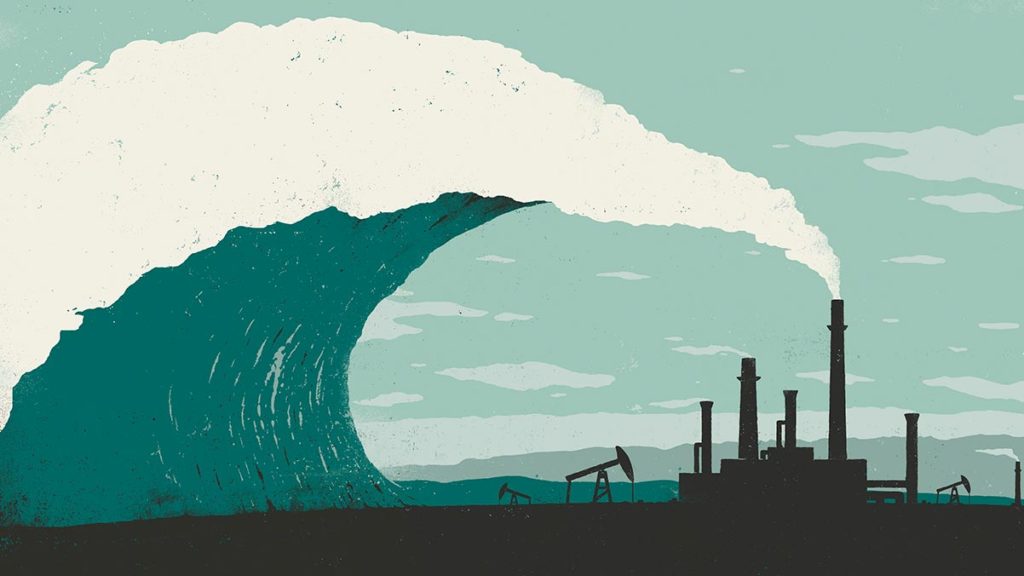Español | Português | Deutsch | Italiano | Català | Français | Galego
From September 20 to 27, there will be a week of action called by the Global Climate Strike. The call has been supported by movements such as Fridays for Future and Extinction Rebellion, as well as hundreds of environmental groups and ecologists around the world. The organizers are demanding that governments declare a climate emergency and adopt urgent measures to halt the environmental crisis. Faced with the urgency of the climate crisis, we need to develop a strategy that attacks the cause of the eco-social catastrophe that threatens us all: the capitalist system
Capitalism and the Global Environmental Crisis
Capitalism has prospered for centuries by exploiting nature, either as an “inexhaustible” supply of resources to produce commodities, or as a waste dump. But the earth’s ability to endure the destructive processes of capital is reaching its limit.
Capital’s need for constant growth has led to the interruption of a complex natural cycle that took millions of years to develop. This has created a rift in the “metabolism” (to borrow Marx’s term) between society and nature.
Climate change and the crises of the biological cycles of carbon, water, phosphorus and nitrogen; the acidification of the oceans; the accelerated loss of biodiversity; the changes in the quality of soil and chemical pollution by industry—these are some of the terrible expressions of a completely unprecedented situation for humanity, namely the tendency toward the destruction of our natural conditions for production and reproduction. This destructive tendency is directly related to the social and material deprivation of hundreds of millions of people who suffer misery, unemployment and precarious employment, which capitalism needs to ensure its profitability and reproduction.
The barbarism represented by the recent fires in the Amazon—which were the product of incentives for deforestation (and which were intensified by Brazil’s right-wing President Jair Bolsonaro), the relaxation of environmental laws and the direct action of large landowners and ranchers who started the fires—is just another episode in the continual process of environmental degradation and destruction. The phenomenon of uncontrolled forest fires is growing more frequent, as shown by the fires ravaging Siberia and sub-Saharan Africa (which are more numerous, though less destructive than those in the Amazon), as well as the fires in California last autumn and in many regions of Europe. Climate change and the thirst for profit are intensifying them.
Climate Change, an Undeniable Reality
There is a broad scientific consensus that climate change is related to the dizzying increase in greenhouse gases in the atmosphere as a result of human activity. But the problem is not human activity in general. The problem is the activities carried out within a capitalist mode of production. Since 1880, the average temperature on the earth’s surface has risen by almost 1 degree Celsius, according to different investigative bodies. An increase in the global average temperature began during the Industrial Revolution and has accelerated in the neoliberal era.
Projections by the Intergovernmental Panel on Climate Change (IPCC) indicate that the average global surface temperature could increase by 2 to 5 degrees Celsius (3.6 and 9 degrees Fahrenheit) in the coming decades. Ocean levels could rise by 18 to 59 centimeters (7 to 23 inches). The IPCC warns that past and future emissions of carbon dioxide (CO2) will continue to contribute to warming for more than a millennium. At the same time, CO2 particles in the atmosphere recently exceeded 400 parts for million (ppm), and may even reach 500 ppm in the coming decades, levels never seen in human history.
According to the latest report by this UN agency (whose estimates are usually very conservative compared to other studies), emissions of greenhouse gases would have to be reduced by 45% by the year 2030—in less than 11 years—in order to avoid hitting the critical threshold of 1.5 degrees Celsius of warming. Above this level, there will be a generalized increase in ocean levels, extreme weather events and food shortages. The need for drastic measures against climate change is undeniable.
For many people, these estimates may seem abstract. But they become concrete when their real consequences are felt, in the form of the stronger climate-related catastrophic phenomena, with increased duration and frequency. Uncontrollable fires sweeping through entire cities around the globe (which is also associated with the spread of invasive species and forest management practices devoted to monoculture for profit), extreme heat waves, massive floods or catastrophic droughts. According to the UN, there are currently more than 20 million climate refugees. If the global temperature rises to more than 2 degrees, it is estimated that this number will grow to 280 million. Air pollution caused by vehicles (gases and particles) and industrial production in large cities kills 9 million people a year—800,000 in Europe alone.
Global warming is one of the most devastating expressions of the destructive nature of the capitalist system toward the environment. But it is not the only one. Capitalism also leads to the pollution of our air and water, soil degradation, deforestation, and the destruction of biodiversity. According to one study, the size of vertebrate populations has decreased by an average of 60 percent between 1970 and 2014. This trend will accelerate if the ecological crisis is not halted, and could produce a mass extinction of the planet’s biodiversity. The entire planet has been transformed into a giant garbage dump for the household, industrial and agricultural waste generated by capitalist production, distribution and consumption patterns.
Climate Denialism and “Green Capitalism”: Two Sides of the Same Coin
Faced with the catastrophic scenario that global warming entails, the powers of international capitalism waver between two strategies: On the one hand, there is a campaign to deny scientific evidence as a supposed ideology; on the other, there is a strategy to promote “green” or “sustainable” capitalism. Green capitalism defends farcical international agreements and proposes partial and limited changes to productive systems, while strengthening the model of capitalist accumulation and exploitation.
Among the climate denialists are Trump, the Republican Party and the Tea Party in the United States, Bolsonaro in Brazil, and a small minority of scientists. But its driving force is the multinational corporations that bear the greatest responsibility for emitting greenhouse gases that cause climate change. Yet while they are sponsoring climate denial campaigns, these large capitalist corporations are completely aware of the consequences of climate change and its socio-political effects, and they are preparing to respond to its implications in the fields of security and foreign policy. The most concentrated sectors of capital are proposing militarization as an instrument to adapt to climate change: more private armies and security forces that will eventually be able to defend the islands of prosperity in oceans of misery and decay.
On the other side is green capitalism, promoted by the U.S. Democratic Party, political leaders of the main European countries including Angela Merkel, Emmanuel Macron and Pedro Sánchez, and various green parties. This list includes many booming capitalist corporations, international organizations and even environmental NGOs. This is an exercise in synergy between neoliberalism and the “green economy.” They speak out against global warming and agree, in expensive climate summits, on environmental measures and big targets for emission reduction. In all cases, these have been nothing more than diplomatic documents without practical implications.
At the same time, they talk about fixing the environment. This would include limiting the production of toxic substances and the destruction of natural resources, while simultaneously developing new “gentle” technologies. They argue that this would be a new source of economic growth, since the capitalist corporations would extract hefty profits.
The Green Party in Germany, for example, proposes “saving the German economy” with measures for an ecological transition, while supporting the militarization of German imperialism (they called for intervention in the conflict with Iran under European leadership). This is a policy of “green imperialism” to solve the crisis of German capitalism.
One of the most recent measures of this kind, pushed forward by the Merkel government and the Green Party in Germany, but increasingly adopted by other governments and environmental groups, seeks to implement a tax on CO2 emissions. This would tax consumption of meat, gasoline and flights to finance the ecological transition of industry. This kind of tax would lead to a rise in prices and weaken the purchasing power of the working class, but it would not have a serious effect on emissions. In short, the neoliberal strategy of green capitalism ends up being a sort of light denialism.
Capitalism’s very essence is the expansion of profit and accumulation at any cost, even if this includes the material destruction of the planet. As China and the United States, together with the European Union, are producing most of the greenhouse gases that are annihilating the troposphere, and the capitalists waver between denial and powerless summits to manage the environmental crisis, the rest of the world continues to suffer the effects of climate change.
That is why green capitalism is a pipe dream. It claims to effectively eliminate the causes of the global environmental catastrophe that threatens us and promote a sustainable development of humanity and the species that populate the planet. But it can do no such thing. The solution to the global climate crisis cannot emerge from the system that created it.
There are a large number of environmental groups and NGOs in this field, including the IUCN, WWF, and even Greenpeace, that work together with the evangelists of capitalist ecological efficiency: oil companies like Shell and Exxon, mining corporations like Barrick Gold and huge behemoths like Walmart, Cargill and Monsanto. In this way, they provide a “green” cover for the plunder of natural resources all over the planet.
Green Reformism and the Green New Deal
On the spectrum of the defenders of green capitalism, there is a reformist variant that has gained a lot of attention recently: the Green New Deal, which calls for a program with hints of neo-Keynesianism in order to face the crisis. In the United States, this policy is supported by some candidates in the primaries of the Democratic Party, including Bernie Sanders and Elizabeth Warren, and also by the self-styled democratic socialist Alexandria Ocasio-Cortez. The GND is also appearing in speeches and programs by European social-liberal parties like the PSOE or neoreformist tendencies like Podemos.
According to Ocasio-Cortez, the GND would allow the U.S. to transition to 100% renewable energy within 10 years, while creating millions of jobs linked to the construction of an efficient electrical grid throughout the country based on renewable technology, among other measures. How? By subsidizing billion-dollar corporations, the ones responsible for the current ecological crisis, so they can develop infrastructure to get us out of it. For this, they are to receive massive subsidies from the state.
The idea behind this perspective is that if the governments of the central industrialized countries in the world and the big multinational corporations become aware of the situation, they will be able to adopt measures to preserve the environment. Both the Green New Deal and similar proposals (like the UN Agenda 2020), which are reference points for many “progressive” forces around the planet, are based on the idea that “sustainable capitalism” is possible and that the corporations that created the crisis can become the saviors of the planet. But the illusion that the contradictions between capitalist interests and environmental preservation—affecting the lives of hundreds of millions of people—can be resolved is utopian and reactionary.
The capitalist mode of production is in total contradiction with nature and its processes of development. For capital, the determining factor in this process is merely quantitative. Fierce competition forces each capitalist to constantly seek ways to replace workers with machines that increase the productivity of labor and the mass of goods thrown onto the market. This increases the amount of natural resources needed to produce them. The constant repetition of production and reproduction of capital ruthlessly eats up all resources, without taking into account the time required for their natural production and regeneration.
The cause of this type of environmentally destructive development, rather than capitalist irrationality, is its inherent logic. It is the logical result of an economic system whose engine is the capitalists’ thirst for profit.
The Youth Climate Rebellion: Its Potential and Its Limits
On August 20, 2018, the young Swedish climate activist Greta Thunberg stood in front of the Swedish parliament with a banner that read: “School Strike for Climate.” This action inspired the movement “Fridays for Future” in European cities. Students skip classes and demonstrate against the global environmental crisis under the slogan “There Is No Planet B.” This has gained more and more supporters, mobilizing hundreds of thousands in hundreds of cities across the continent.
Other ecological movements have also developed, including “Ende Gelände” in Germany and “Extinction Rebellion” in the United Kingdom. They have similar demands but different methods of struggle.
The first global climate strike was called for March 15. Hundreds of thousands of young people took to the streets in different cities around the world as part of a student strike against climate change. In Madrid, Berlin, Paris, Vienna, Rome and other cities in Europe and the world, the demonstrations were massive. On May 24, there was a new global call for a student strike, which mobilized millions. A new Global Climate Strike will take place on September 20 and 27, with calls for the citizenry and other social organizations to join.
The organizers are demanding that governments declare a climate emergency and adopt urgent measures to stop an environmental crisis that “is the result of a model of production and consumption that has proven to be inadequate for satisfying the needs of many people, that puts our survival at risk, and unfairly impacts the poorest and most vulnerable people in the world.”
These measures include reducing net greenhouse emissions to zero and preventing global temperatures from rising above 1.5 degrees Celsius. To this end, they propose actions aimed at abandoning fossil fuels and substituting them with renewable energies, actions such as blocking the construction of new fossil fuel infrastructure, implementing a nonnuclear energy model and the reorganizing the production system.
These movements also point out the relationship between growing social inequality and the degradation of the environment. They propose that the transition to an “eco-sustainable model” has to take into account the inequalities produced according to social class, sex, national origin, etc. In the framework of this transition, they call for different areas of production, including energy, transport and food, to be democratized and put under the control of citizen bodies.
The fact that young people are mobilizing against the barbarity of environmental destruction is enormously promising. In addition, the use of strikes to make their demands heard, and the call on all organizations of civil society to join, is an innovation that has not been done before. This gives more strength to the movement.
Faced with the “infernal powers” that capitalism has created, and whose consequences now seem inevitable, the young activists of Fridays for Future and similar movements are increasingly aware of this reality. Although often in an abstract or indirect way, they name the capitalist system as the cause of the current crisis.
They still lack, however, a defined program and strategy to overcome it. Their perspective is limited to denunciation. They demand that capitalist politicians take urgent measures, or they have embraced the proposals of the so-called green parties, but without proposals to move against the interests (and property) of those who bear the greatest responsibility for the current situation: the big multinational corporations.
Nor do they position themselves against “green” measures that threaten the majority of the working class and the poor masses, such as consumption taxes. On the contrary, in many countries the movement is demanding the implementation of even higher taxes on CO2 emissions than the capitalist parties are proposing. This would raise the prices of consumer goods for the majority of the population. In order for the youth to win the working class for the fight against climate change, they need a program that clearly states that it is the capitalists, and not the working masses, who must pay for the crisis.
In broad sectors of the movement, the dominant logic is that the key to solving the ecological crisis is changes in individual consumption, focusing their attention on “irresponsible consumption.” Obviously, capitalist production, which generates consumption cycles that span the globe, molds “consumers.” In this way, individual human behavior contributes to the ecological crisis, and it is desirable to encourage new forms of consumption by creating environmental consciousness.
Yet changing individual behavior often has only a negligible effect on capitalism’s environmental consequences. Its effect is, moreover, highly unequal. An Oxfam report from 2015 showed that the richest 10% of the planet causes half of CO2 emissions, while the poorest 50% (3.5 billion people) is responsible for only 10%.
The logic of focusing the environmental movement on changes in individual behavior implies two strategic problems. First, it encourages an individualist conception, blurring or directly obscuring the “center of gravity” that needs to be attacked, namely imperialist capitalism, the big corporations and the capitalist states. Second, it strengthens the reactionary argument that “the people are responsible for the crisis,” which leads to measures that force the working class and the poorest sectors of society to pay for the environmental crisis. This argument preserves the system and benefits the capitalists, and it prevents the one social force that could confront capitalism from joining the struggle.
One of the lessons provided by the Yellow Vest movement in France—an immense social movement triggered by an increase in the gasoline tax—is that the “ecological transition” cannot fall on the shoulders of the working class and poor masses. In the context of the ecological crisis, the central problem is not the “division” between those who pollute and those who do not, but rather between the social majority that is already paying the costs of the crisis and the capitalists that caused it.
The only way to confront the global environmental crisis caused by capitalism is for the majority of the population to join the struggle, with the working class at the forefront. This is because the contradiction between capital and labor is not just one of capitalism’s many contradictions; it is the contradiction that structures capitalism itself. If the relationship between society and nature is mediated by production, it is only by revolutionizing production that the metabolism with nature can be rationally regulated. That is why the working class, which is the only authentically productive class in society, can knit together a social alliance that can pull the “emergency break” on the coming disaster.
There are important examples of unity between the environmental movement and sectors of the working class. That was the case with the Harland and Wolff shipyard in Ireland, where the Titanic was built. That shipyard was declared bankrupt, but the workers took over the plant demanding its nationalization in order to produce clean energy. There have also been calls by workers for the unions to call a climate strike, for example, in Portugal, Germany and Spain.
These initiatives are extremely important. In an intuitive yet correct way, they point to the “social subject” that can hegemonize the struggle for an alternative to environmental destruction: the working class.
The need for the working class to join this movement with its own demands and its own methods of struggle (strikes, blockades and pickets) is vital for developing the movement. It is necessary to help break down the prejudices that exist in wide sectors of the working class about the environmental movement—prejudices often justified by policies supposedly in “defense of the environment” that attack the working class, equating it with the polluting bosses and worsening its living conditions.
Above all, it is necessary to confront the reactionary role played by the majority of the bureaucratized trade unions. Especially in the sectors of heavy industry and energy, the union bureaucracies act as the capitalists’ best partners. Many times they oppose any measures for ecological transition, however superficial they may be, under the slogan of “saving jobs.” What they are really saving is the capitalists’ profits, tying the destiny of the working class to the success of the bosses.
Facing the Climate Strike, the unions in Europe and the United States mostly oppose it—or in some cases, such as in Germany, they support it demagogically while refusing to organize any actions that would supposedly be “illegal.” That is why, alongside the broadest self-organization of the youth, it is necessary to denounce the reactionary positions of the bureaucratic unions, which for decades have ignored or played down ecological problems. We must demand that they call a strike and put their organizations in the service of the struggle against the capitalists responsible for the looming catastrophe that threatens us all.
The declaration in Germany by a group of rank-and-file trade union activists called ver.di aktiv (which is supported by RIO, the Revolutionary Internationalist Organization) has received more than 500 signatures from trade unionists across the country and from different sectors. It demands that the large trade unions call for a strike. This is a small but significant expression of that policy.
An Anti-Capitalist Transitional Program to Prevent a Catastrophe
Faced with capitalism’s absolutely irrational perspective, the need for drastic and urgent measures is evident. But these cannot depend on the good will of the governments of the imperialist powers that are principally responsible for the current disaster. Nor can they depend on the new agendas promoted by big corporations and bourgeois parties in the name of “green capitalism.”
The only solution to the catastrophe that threatens us is to take the present and the future into our hands by subjecting the world economy to a rational plan. Or, as Marx said, through “the introduction of reason into the sphere of economic relations.” This will only be possible if the economy is in the hands of the only class that, as a result of its objective situation and material interests, has an interest in preventing a catastrophe: the working class.
We, the organizations that make up the Trotskyist Fraction–Fourth International, fight for this perspective within the workers’ movement, among the youth and inside the environmental movement. Faced with the farce of climate summits and the promises of green capitalism, we must fight for a transitional program aimed at establishing a completely rational and ecological reorganization of production, distribution and consumption, with measures including the following:
- The expropriation of the entire energy industry, under the democratic control of the workers, supervised by committees of consumers. In this way, the energy sector can advance toward a sustainable and diversified energy mix, prohibiting fracking (of gas and oil) and other extractive technologies, which would drastically reduce CO2 emissions by developing renewable energies with low environmental impact, in consultation with local communities. At the same time, abusive prices for electricity would be reduced.
- The nationalization without compensation of all transport companies, under workers’ control and with a perspective of technological reconversion. This should also include big automotive companies to achieve a massive reduction in automobile production and private transport, while developing public transport at all levels.
- The struggle for safe working conditions at all factories and companies, free of toxins and pollutants, alongside the reduction of working hours and the distribution of all necessary hours among all available workers, without a reduction in pay. This should be part of a general plan for a rational and unified reorganization of production and distribution in the hands of the working class and its organizations.
- The expropriation of big landowners and agrarian reform for small farmers and indigenous people. The expulsion of imperialist companies and the confiscation of their goods. The expropriation under workers’ control of the entire (exporting) agribusiness complex. Monopoly of foreign trade and nationalization of the banks to finance the conversion and diversification of agricultural production along sustainable and democratic lines. Prohibition of glyphosate, progressive elimination of all pesticides and prohibition of marketing them, and investment in research in alternative methods, such as ecological agriculture, among others.
- The establishment of well-financed funds for the conservation of biodiversity, including both species and the planet’s great variety of ecosystems, with special emphasis on those most at risk. Regeneration of polluted areas (seas, rivers, lakes, forests and meadows) by imposing progressive taxes on big business.
- The prohibition of polluting mountaintop removal mining, and the nationalization of traditional mining under workers’ control. The development of an industry to recover minerals from electronic garbage and the implementation of “urban mining” by recycling scarce minerals from electronic devices. Expulsion of the imperialist mining companies and confiscation of their assets to repair the damages caused to local communities. Prohibition of the private appropriation of public goods, such as water.
- Debt cancellation for all dependent and semicolonial countries, debt being a form of coercion to make these countries adopt (anti-environmental) neoliberal restructuring. The expropriation of all polluting companies in peripheral countries. Resolving the ecological crisis in those countries is unthinkable without completely breaking with imperialism.
- Opening borders and closing migrant detention centers in the context of the migration crisis, which is a product of poverty and imperialist plunder, but also in many cases also of the climate crisis.
- A radical policy that aims to avoid waste and recycle it. The existing facilities for filtering, purification, etc., are not enough. A fundamental shift in industry is needed to avoid pollution a priori and at the source. This also means ending planned obsolescence.
- The lifting of business secrets (which allows, for example, the concealment of toxic emissions) and the obligation to keep public registers specifying the raw materials and products used in production.
This program, along with other measures of immediate necessity, is obviously impossible to achieve within the framework of capitalism. To implement it, we need a revolutionary strategy to decisively confront those responsible for the disaster. The youth who today take to the streets all over the world to fight for “climate justice” face the challenge radicalizing their program, of raising the only realistic perspective to stop the catastrophe: pushing the class struggle forward to end the capitalist system and to put the world economy into the hands of the working class.
Socialism or Barbarism: For a Revolutionary and Internationalist Strategy
Many scientists, environmentalists, international organizations and even large media outlets characterize the current moment as one of “civilizational crisis.” According to this idea, we are past the point of no return and can hope only to adapt to the disaster. In the face of this catastrophe foretold, capitalist ideology sows fear, which underpins both security policies and supposed individual solutions under the leadership of capitalist governments and big business. It also denies a liberating perspective. From cinema and television we get a constant stream of dystopias: it is easier to imagine postnuclear worlds, alien invasions and even zombies than a society that rationally guarantees the survival of the planet and all its species.
Faced with the prospect of a catastrophe, the fundamental problem is whether the adaptation to climate change will be in the hands of capital or in the hands of the dispossessed majority of society. For this reason, the ecological crisis makes it necessary to fight for communism as the only perspective for the salvation of humanity and the planet. Communism means a society of free and associated producers in harmony with nature. In this struggle, the working class must position itself as the hegemonic subject, taking environmental demands not only as part of the struggle to improve their living conditions, but also to offer a progressive solution to the ecocide that capitalism is preparing.
This is the indispensable precondition for establishing a system based on solidarity, which rationally reestablishes the natural metabolism between humanity and nature, and which reorganizes production in a way that respects natural cycles without exhausting our resources. This would simultaneously end poverty and social inequality.
In the face of the environmental catastrophe that threatens us, the dilemma posed by Rosa Luxemburg—“socialism or barbarism”—acquires a renewed significance. On the eve of the imperialist carnage that began in 1914, the great Polish revolutionary warned that “if the proletariat fails to fulfill its tasks as a class, if it fails to realize socialism, we will all crash together into a catastrophe.” For Luxemburg, socialism is not a destiny predetermined by history. The only “inevitable” thing was the collapse that capitalism was leading to, and the calamities that would accompany this process if the working class failed to prevent it.
In our century, the era or crises, wars and revolutions has reemerged, threatening the working class and the peoples of the world not only with war and misery, but also with environmental catastrophe and the potential destruction of the planet itself. A truly ecological project that confronts the environmental crisis to which capitalism is leading us can only be communist. The working class, allied with the poor masses, must be subjectively prepared to fight for this program as the vanguard of revolutionary struggle, breaking the resistance of the capitalists.
* * *
The Trotskyist Fraction—Fourth International (FT-CI) is an international revolutionary organization which publishes the La Izquierda Diario / Left Voice network of online newspapers in 12 countries and 8 languages. It is made up of:
ARGENTINA: Partido de los Trabajadores Socialistas (PTS) / BRAZIL: Movimento Revolucionário de Trabalhadores (MRT) / CHILE: Partido de Trabajadores Revolucionarios (PTR) / MEXICO: Movimiento de los Trabajadores Socialistas (MTS) / BOLIVIA: Liga Obrera Revolucionaria (LOR-CI) / SPANISH STATE: Corriente Revolucionaria de Trabajadoras y Trabajadores (CRT) / FRANCE: Courant Communiste Révolutionnaire (CCR) which is part of the NPA (Nouveau Parti Anticapitaliste) / GERMANY: Revolutionäre Internationalistische Organisation (RIO) / UNITED STATES: comrades of Left Voice / VENEZUELA: Liga de Trabajadores por el Socialismo (LTS) / URUGUAY: Corriente de Trabajadores Socialistas (CTS) / Sympathizing organizations: ITALY: Frazione Internazionalista Rivoluzionaria (FIR) / PERU: Resistencia Sur / COSTA RICA: Organización Socialista
Translation: Nathaniel Flakin











